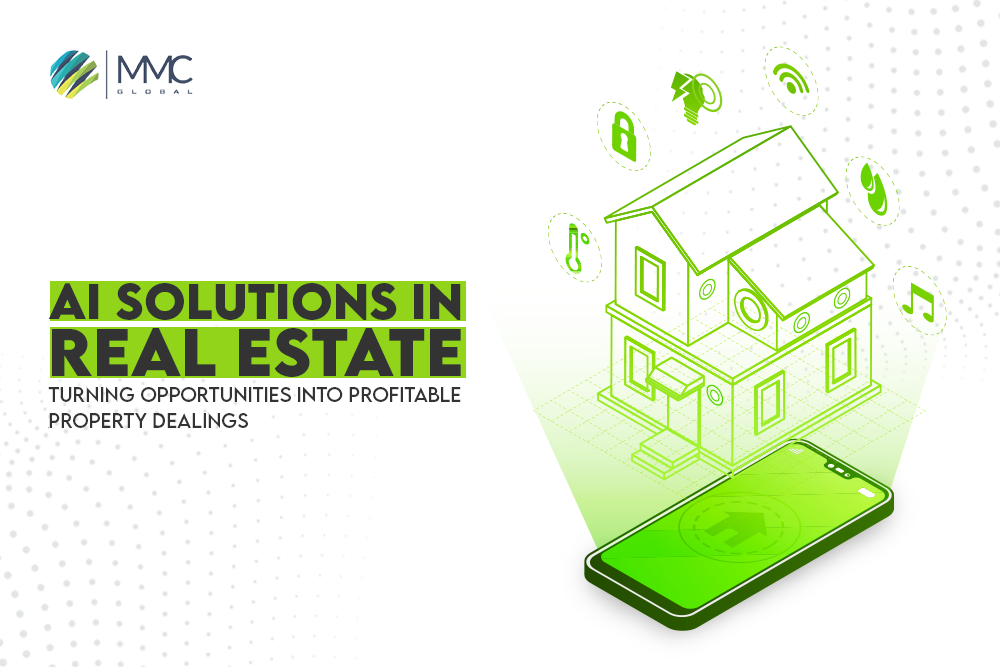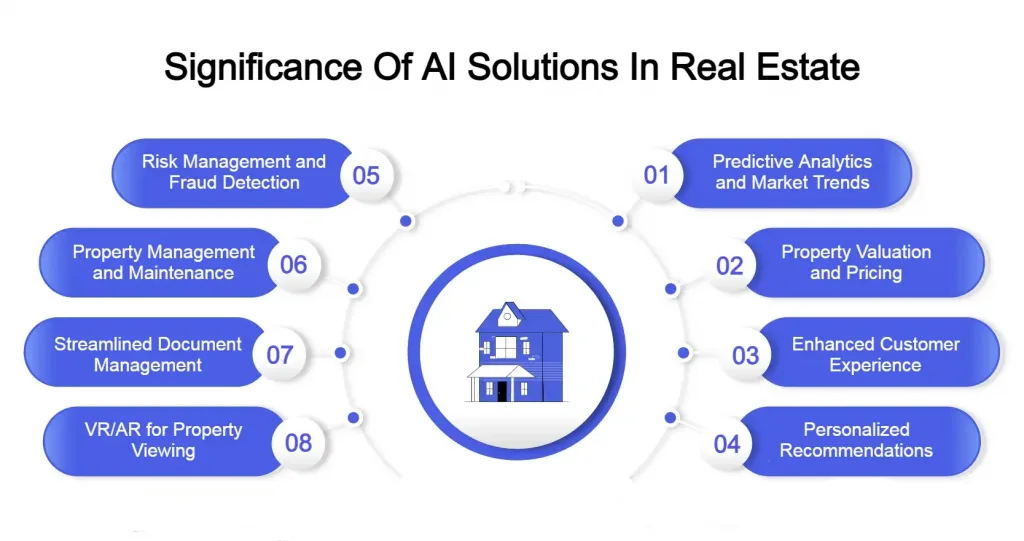AI Solutions In Real Estate: Turning Opportunities Into Profitable Property Dealings


The real estate business is immensely expanding worldwide, and people are dealing across the border and selling and buying property easily. Modernistic real estate businesses have been infused with AI to deliver impeccable experiences in the realm of property dealings. The advancement of AI solutions has transformed the real estate business by enhancing the efficiency of client data storage, property listings, data analysis, aesthetic visuals of properties, and much more.
Artificial intelligence seamlessly benefits the real estate industry and allows it to integrate with existing or new systems to ensure optimal business growth. AI solutions embrace commercial and residential real estate operations, simplify dealing with clients, capture real-time insights, and much more.
If you belong to the real estate business, understanding AI fusion is most important to thrive in this digital landscape. In this article, we will elaborate on the optimal use of AI solutions in the real estate industry and help you get one that actually works for you.
Types Of Real Estate Solutions
Real Estate Software
One of the most in-demand real estate solutions is real estate software, which professional software developers thoroughly build. It can be customized with bespoke features and functionalities according to your needs. Moreover, the software can be property listing, rental management software, CRM software, property file management software, or anything else.
Real Estate Mobile Applications
To make your real estate business more accessible, you can build your own real estate mobile app to sell or buy property with the utmost convenience. Mobile applications are more accessible and easy to use, which is why the mobile app market has been upsurging in recent years.
ERPs For Real Estate Business
ERP or enterprise resource planning software that centralizes all major functions of business, including finance, accounting, CRM, sales, and marketing. It is software that helps integrate all the individual systems into one centralized solution to enhance collaboration, better check and balance, and enhance the productivity of the employees. Moreover, ERPs in real estate allow better finance management, streamlining property listings, real-time trends and insights, enabling maximum sales openings, and much more.
[Nasir-hu-mein heading=”Integrate AI Solution In Your Real Estate Business” para=”From property listing to closing deals, AI solutions in real estate lie in their ability to revolutionize traditional practices, making them more efficient, transparent, and customer-centric.”]Significance Of AI Solutions In Real Estate

Predictive Analytics and Market Trends
AI solutions in real estate enable the analysis of vast amounts of data to predict market trends and property values. By utilizing ML algorithms, AI solutions can identify patterns and correlations within the real estate market. Moreover, it helps investors and stakeholders make informed decisions. Predictive analytics assists in foreseeing shifts in demand, property appreciation, and market fluctuations, facilitating strategic planning for real estate professionals.
Property Valuation and Pricing
AI solutions streamline the property valuation process by incorporating various factors such as location, amenities, market trends, and historical data. Automated valuation models (AVMs) powered by AI solutions provide accurate and timely property valuations. As a result, it enables sellers set competitive prices and buyers to make informed decisions. This not only saves time but also minimizes the risk of overpricing or underpricing properties.
Enhanced Customer Experience
AI-driven virtual assistants and chatbots enhance the overall customer experience in real estate. Moreover, these tools can answer queries, provide property information, and assist in the initial stages of property transactions. This 24/7 accessibility improves customer satisfaction and engagement. As a result, it allows real estate agents to focus on more complex aspects of the buying or selling process.
Personalized Recommendations
Machine learning algorithms can analyze user preferences, search history, and behavior to offer personalized property recommendations. This customization enhances the property search experience for potential buyers, making it more efficient and tailored to their specific needs. Real estate platforms employing AI solutions can thus provide a more relevant and engaging user experience.
Risk Management and Fraud Detection
AI solutions contribute significantly to risk management in real estate transactions. It can identify potential risks and anomalies in financial data, helping prevent fraudulent activities such as money laundering or property scams. By analyzing patterns and detecting irregularities, AI solutions enhance the security and integrity of real estate transactions.
Property Management and Maintenance
In the realm of property management, AI solutions facilitate efficient maintenance and operations. Smart building systems use AI solutions to monitor equipment performance, predict maintenance needs, and optimize energy consumption. This not only reduces operational costs but also enhances the overall sustainability and longevity of properties.
Streamlined Document Management
Real estate transactions involve extensive paperwork, and AI can streamline document management processes. Natural Language Processing (NLP) algorithms can extract relevant information from legal documents, contracts, and agreements, minimizing the chances of errors and speeding up the transaction process. In fact, this contributes to increased efficiency and reduced administrative burdens.
Virtual and Augmented Reality for Property Viewing
AI-driven virtual and augmented reality technologies revolutionize property viewing. Prospective buyers can take virtual tours of properties, allowing them to explore interiors and exteriors remotely. This technology enhances the efficiency of property showcasing, especially for international buyers or those unable to attend physical viewings, thereby broadening the potential buyer pool.
Ending Note
In conclusion, the integration of AI solutions in real estate brings numerous benefits ranging from data-driven decision-making and enhanced customer experiences to improved operational efficiency and risk management. As technology continues to advance, the real estate industry stands to gain even more from the innovative applications of artificial intelligence.
The significance of AI in real estate is marked by its transformative impact on decision-making, operational efficiency, and customer experiences. By leveraging predictive analytics, AI solutions empower stakeholders to make informed choices based on accurate market insights and property valuations.
Automation reduces manual efforts, enhancing productivity and enabling professionals to focus on strategic tasks. AI-driven technologies such as virtual property tours and personalized recommendations redefine the property search process, offering a more engaging and efficient experience. Furthermore, AI contributes to risk mitigation, fostering transparency and trust in real estate transactions. In conclusion, the integration of AI in real estate not only revolutionizes traditional practices but also sets the stage for continuous innovation, ensuring the industry remains dynamic, customer-centric, and well-positioned for future growth.



